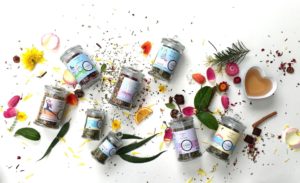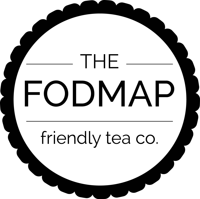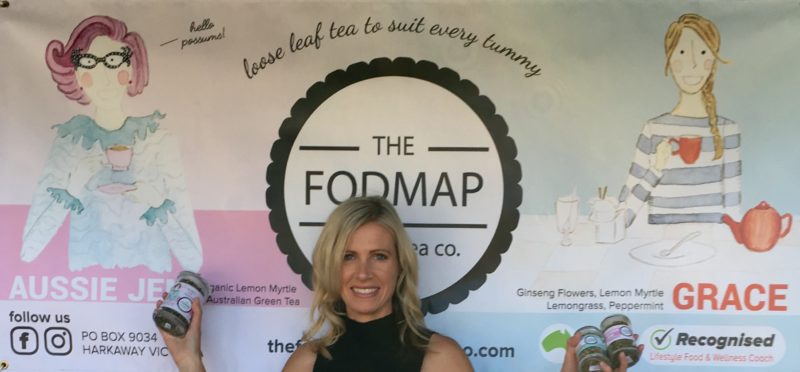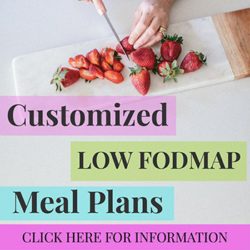How Carolyn’s passion about helping IBS sufferers to heal their digestive system, has lead her to create the first FODMAP Friendly Teas.
The guest on today’s episode, Carolyn Lindrea, has created delicious tea blends that will help many people, and especially IBS sufferers. She is also a Health Coach and looks at all areas that may be contributing to your digestive issues to successfully guide you through the phases of the low FODMAP diet.
In this episode, you’ll learn:
- How did Carolyn’s food intolerance and IBS symptoms start?
- How did she get Giardia and what is it all about?
- How did she discover the low FODMAP diet?
- Why did she decide to become a health and wellness coach?
- Have her symptoms improved?
- How important is stress management?
- Why did she create the FODMAP Friendly Tea Company?
- What do those tea blends contain?
- Where can we buy her FODMAP Friendly certified teas?
LISTEN OR DOWNLOAD THE LOW FODMAP DIET & IBS PODCAST EPISODE 19 HERE
Click here to leave an iTunes review and subscribe to the show
Can’t listen to this episode right now? Read the transcript below!
LARAH: Hi, and welcome to the Low FODMAP Diet and IBS Podcast. My guest, Carolyn Lindrea, is a certified lifestyle food and wellness coach and she also has a certificate in stress management, nutrition, food psychology and the low FODMAP diet. Carolyn is also the founder of the FODMAP Friendly Tea Company. Carolyn suffers from IBS and was diagnosed with fructose malabsorption in 2009. Because of her intolerance she has a great interest in gut health and she’s studied the subject extensively in an effort, especially, to ease her own symptoms and regain control of our health. It is with pleasure that I introduce you to my guest, Carolyn.
LARAH: Hi, Carolyn.
CAROLYN: Hi, Larah. How are you?
LARAH: Very good, thank you. It’s a pleasure to have you here on the podcast.
CAROLYN: Thank you. Glad to be here.
LARAH: So the first question I have for you — if you would like to explain to the listeners a little bit about your food intolerance and the IBS symptoms you used to suffer from and how it all started.
CAROLYN: Yes, well I malabsorb fructose and suffer from excessive bloating and IBS. So my journey really started back in 2005 when I had a bout of Giardia that went undiagnosed for four months. Giardia is a parasite that is found in contaminated water. So I’d just had a baby and I felt constantly nauseous; I couldn’t eat and lost a lot of weight. I saw so many doctors and it was a naturopath in the end who suggested I look into Giardia which I’d never heard of before.
LARAH: Yeah.
CAROLYN: So that caused havoc in my digestive system and it was the beginning of my gut problems.
LARAH: So did you get contaminated water from Australia?
CAROLYN: Yes, from a little town. It’s in New South Wales.
LARAH: Yeah, that’s unusual isn’t it?
CAROLYN: Hmmm… because I’d just had a baby, too, I think you’re more susceptible to picking these things up as well, because the rest of the family didn’t get it.
LARAH: Yeah, got it. So is that all good now with the Giardia?
CAROLYN: Yes. I’ve had it since then, because then you’re susceptible to getting it again.
LARAH: Okay.
CAROLYN: Yeah, it’s caused me a lot of gut issues.
LARAH: Okay, and eventually with your IBS did you get a proper diagnosis from a doctor and did you have to do any tests?
CAROLYN: Yes. So about four years later, so that was in 2009, I was to meet up with this unfriendly parasite again as we moved to property on the outskirts of Melbourne, along with tank water. I knew my symptoms straight away so I went along to a clinic and my doctor wasn’t very happy when I self-diagnosed. She went to dig a bit deeper and realised I’d suffered from IBS for a long time and wanted me to go and get some tests for food intolerances as my symptoms were similar. So I went along to the hospital where I had a Hydrogen Breath Test. It’s where I find out about the fructose and, yeah, my results skyrocketed and I was sent home earlier actually.
LARAH: Okay.
CAROLYN: So I’m lucky that the doctor did, you know, think otherwise. I did have Giardia, but she cleared up issues that I’d dealt with for with many years.
LARAH: Did they ask you to do any other breath testing or just the fructose one?
CAROLYN: Oh, I did do the breath testing for lactose as well, but that was fine. It was just the fructose malabsorbtion.
LARAH: Yeah, okay. And can you have a little bit of fructose or none at all?
CAROLYN: Yeah, I haven’t really had much luck with introducing other foods.
LARAH: Can you have a little bit of fruit that contains fructose, or none at all? For example let’s say, the low fructose strawberries?
CAROLYN: Yeah, well I just stick to that really, but at times I want a little bit of pear in a salad, but just a tiny bit because I just don’t want to suffer from any symptoms.
LARAH: Yes, that’s right. So you’re pretty much okay with most low FODMAP fruit, but with a high one, if it’s in a tiny quantity, you may just be okay?
CAROLYN: Yes, I’ve got used to kind of embracing the berries and citrus fruits.
LARAH: Yeah, I love mango, and when the mango season starts it’s really difficult not to have two or three like I used to have. I’ll have a slice and if I’ve been pretty low FODMAP the rest of the day, I know I can tolerate a little bit of it.
CAROLYN: Right, because mangos, it’s beautiful like in a chicken salad, isn’t it?
LARAH: Oh, yes, with anything. And I only discovered mango when I came to Australia because, well obviously, in Italy there was no mango when I was growing up. Maybe you can find it imported now. And even when I lived in England for ten years; it wasn’t something that was really imported, and when I came to Australia it was like, “Ah, how did I never know about this delicious fruit?”
CAROLYN: And then you had too much of it.
LARAH: Probably. So after being diagnosed with IBS and finding out you had fructose malabsorption, how did you then find out about the low FODMAP diet?
CAROLYN: Through research, really. I found out that Sue Shepherd was holding a seminar locally, and it was amazing. She just answered all the questions I had and defined the diet in detail and I left there feeling really confident. And since then I started using the Monash University app and the FODMAP Friendly app and found they’re great tools to use as they are updated constantly with newly tested foods.
LARAH: Yes, those apps are really great and I use them all the time, and especially at the beginning…
CAROLYN: Yes, and even to just check foods you haven’t eaten for a long time, and sometimes you can then have a small portion of it.
LARAH: That’s right. And even for the quantity, it’s like I might know that, yes, that food is okay, but I’m not one hundred percent sure how much I can have. It’s just useful to refer back and say, “Okay, I can only have half a cup.” So that’s tiny. So eventually, did you have to go through the whole elimination of high FODMAP food and try and reintroduce them later on — going through all those phases of the diet? And if you did, did you have any supporting guidance of a health professional or a dietitian specialised in the low FODMAP diet?
CAROLYN: I did see a dietitian for a while, but I found no luck, really, with reintroducing foods although I can tolerate a bit of garlic. So that’s why I became a health coach, because I felt lost and overwhelmed with the diet and I want to help others to be able to understand and embrace the diet.
LARAH: Okay. Was it maybe because the dietitian wasn’t specialised in the low FODMAP diet or…?
CAROLYN: Well, it could have been. I probably should have looked around at that time, but, yeah, looking back…
LARAH: Yes.
CAROLYN: … because I did feel so lost.
LARAH: Yeah.
CAROLYN: You know, that’s where research and Google comes in. I mean you can get a lot of conflicting information and back then there wasn’t as much out there.
LARAH: Yeah, absolutely, because you were diagnosed in 2009 so that’s a real long time ago. I don’t think there was much information at all, unless you went through all the medical journals and all of those to get some answers.
CAROLYN: Well, that’s right. There wasn’t really all the social media platforms or I wasn’t aware of them anyway. I’ve only got onto those probably in the past year.
LARAH: Yeah, I get it. So how do you feel now in terms of your IBS symptoms? Do you feel like you’ve been able to improve those symptoms or do you still have them sometimes?
CAROLYN: I feel great now as long as I don’t muck up. I recently went to Thailand and although I asked for no onion in my meal it must have been hidden in some sauces and other things, so I was so bloated. I looked about six months pregnant!
LARAH: Uh-huh.
CAROLYN: It isn’t great when you’re wanting to wear a bikini. But normally, day- to- day, I’m really good.
LARAH: Yeah, that’s good. That’s excellent. So in terms of any food that you really miss that you haven’t been able to reintroduce back, is there anything at all?
CAROLYN: I missed a lot of foods at first and even for a few years. I would cook meals for the family that I couldn’t eat, but as the years have gone by, I’ve lived a healthier lifestyle with more health foods so I don’t really think about it anymore.
LARAH: Okay.
CAROLYN: I used to love a good wrap though, and a croissant now and again. But I cook FODMAP friendly meals now for the whole family and, you know, they have even admitted they like the alternatives better. So there you go.
LARAH: That’s good. So your family has adjusted to the low FODMAP version and probably it’s just at dinner time that you would prepare low FODMAP food and everyone else will have high FODMAP food for lunch at school, or work. So it’s just really the dinner that is becoming low FODMAP for everyone, isn’t it?
CAROLYN: Yeah, that’s right. But I really have cut out a lot of sugar, as well, for the whole family and I don’t really have the packaged foods that used to have either as well so…
LARAH: Yeah, that’s so much better anyway for everyone.
CAROLYN: Yes, it is.
LARAH: And there’s so much sugar. Even though sugar is low FODMAP, it’s just not healthy.
CAROLYN: Well that’s right, and I have a few teenagers. They’re girls, so they want to watch what they eat as well.
LARAH: Yeah, yeah. I have a fourteen-year old as well…and a ten-year old and they both love their sugar. So it’s really hard to try and measure it and I’m trying not to deprive them too much, but also I try not to encourage them to eat all that packaged food that’s just loaded.
CAROLYN: Yes, that’s right. And it’s not cheap at the supermarket too, isn’t it? Buying all of those packaged foods…
LARAH: I know. l have been trying to make, as well, my own muesli bars, just to make them low FODMAP so I can eat them as well. But just to make it with more whole ingredients and keep the sugar down.
CAROLYN: That’s right. And to know exactly what’s in your recipes as well.
LARAH: Yes. I found myself, all in all, since being diagnosed with IBS and following the diet that I’m preparing more food from scratch rather than buying it ready, even the pasta sauces and all that. I know I’m Italian and I should make everything from scratch, but that was the old generation. The new generation doesn’t have as much time, but now I have to anyway.
So as we heard from the introduction, you have a variety of certificates in several areas of health and lifestyle. Would you be able to talk about those and what they are and how the knowledge that you gained is also helping to improve both your health and the health of your clients?
CAROLYN: Yeah. My course in Health and Wellness coaching was fantastic for my own knowledge of healthy eating, but also understanding that your lifestyle, stress levels and emotions need to be taken into consideration as well. So health coaching works on SMART goals, which is setting smart, measurable, attractive, realistic and time-framed goals.
LARAH: Yup.
CAROLYN: You really need a plan in place to get to where you need to be. So I get my clients to create a vision statement which is the ultimate lifestyle and habits they can see themselves achieving in the near future. And then we set weekly and three-monthly goals — like stepping stones — to achieve their vision. And stress management is also very important; as we know the gut-brain connection is very closely linked.
LARAH: Absolutely.
CAROLYN: So if you want to help your gut you really need to deal with your stress levels as well.
LARAH: Yup, that’s so true. I’m trying to manage doing meditation, yoga and exercise plus the diet. So it’s not just one thing you’ve got to look at. Holistically is what you need to do to improve every aspect of your life.
CAROLYN: That’s right.
LARAH: Yeah.
CAROLYN: Balance…
LARAH: Balance, yes, because we live in a kind of very stressful, on-the-go society and we always say we don’t have time and we don’t have time to look after ourselves, but at the end, that catches up with us. So I actually learned recently to just wake up early and just do my meditation and yoga and everything else I want to do early so that it doesn’t impact my day, and that seems to be working so far.
CAROLYN: Yeah. I’m fine with that too — getting up early, yeah. It’s a lot less stress by the time you’ve got to take the kids to school and you’re just not rushed.
LARAH: That’s right, yes. Just getting rid of that rushed sensation that’s kind of inbuilt into us nowadays.
CAROLYN: That’s right.
LARAH: Let’s now talk about your beautiful teas. I’ve tried a couple of them and they’re so delicious and I’m so glad that someone had thought about making those herbal teas, because I’m a big herbal tea fan. I don’t drink normal tea and coffee, so for me, herbal tea is what I drink during the day. I have two or three cups, but I’m more limited now in the choice, because lots of them are not suitable. I used to drink chamomile at night time — like a really quite strong chamomile actually and, of course, that’s not suitable now, so those teas are fantastic. I tried the Grace and I loved that lemon myrtle. When I had a cup in my office I could smell the lemon myrtle everywhere. It was so beautiful — just like if I had essential oil put around the room. And this morning I tried the slimming one. Is it Slim Jim?
CAROLYN: Yes, Slim Jim.
LARAH: Yeah, Slim Jim. Yeah, that was really good as well. I’d just had breakfast, but I should have had it before breakfast, but my breakfast was just a smoothie so not too bad.
CAROLYN: They’re even a great base for smoothies as well.
LARAH: Yeah, that’s great.
CAROLYN: I’m glad you enjoy them.
LARAH: Very beautiful teas. Can you tell us how you came up with this idea and also explain a bit more what the special thing is about these teas?
 CAROLYN: Yes. Well I was seeking some herbal teas to offer my clients when I found the gap in the market. Most of the ‘soothing tummy teas’ on the market actually contain a FODMAP and a lot of herbs have not been tested yet. I needed to create the blends first and then get them tested as a whole product by the FODMAP Friendly Program. So the results were really interesting as some of the blends naturally contained fructose, sorbitol, and GOS. But now it’s great that we can state the exact FODMAP present on our labels and two of our favourite blends are certified FODMAP friendly. We are the only tea company tested in the world. We are very excited to have such a unique product. And all our teas are soothing to the gut and contain antioxidants, vitamins and minerals. Others help with boosting the immune system, helps tummy cramps and spasms, reduces inflammation, helping IBS, stimulates digestion and relieves stress to name a few.
CAROLYN: Yes. Well I was seeking some herbal teas to offer my clients when I found the gap in the market. Most of the ‘soothing tummy teas’ on the market actually contain a FODMAP and a lot of herbs have not been tested yet. I needed to create the blends first and then get them tested as a whole product by the FODMAP Friendly Program. So the results were really interesting as some of the blends naturally contained fructose, sorbitol, and GOS. But now it’s great that we can state the exact FODMAP present on our labels and two of our favourite blends are certified FODMAP friendly. We are the only tea company tested in the world. We are very excited to have such a unique product. And all our teas are soothing to the gut and contain antioxidants, vitamins and minerals. Others help with boosting the immune system, helps tummy cramps and spasms, reduces inflammation, helping IBS, stimulates digestion and relieves stress to name a few.
LARAH: Yeah, they are very delicious — the ones I tried. That’s really good things that you did. And when did they actually come out?
CAROLYN: About six months ago.
LARAH: Okay, so did they come out first and then you got through the FODMAP Friendly Certification afterwards or did you do go through that first?
CAROLYN: I created the blends first and then got them tested so you have to have a complete product for them to be tested.
LARAH: That is so good. As you said, there is a gap in the market there. So can they be found in shops and supermarkets or are they just found online at the moment?
CAROLYN: At the moment, online at thefodmapfriendlyteaco dot com. And in Victoria we have them at The Whole Food Merchants in Ferntree Gully and Foddies Café in Albert Park. We plan to add more stockists in the near future.
LARAH: Okay, great. And do you plan to expand as well outside Australia eventually?
CAROLYN: I have had some sales in America so we do offer shipping to America.
LARAH: Okay, that’s good. If people are interested, I guess, they go to your website which I’m going to put the link in the show notes and they can find the teas, the descriptions and information on how to purchase them from your website.
CAROLYN: Yes. I also have a free e-book that has more benefits of the herbs used and amazing tea-based smoothie recipes. So that’s found on our website.
LARAH: Great. We will link to that one too. Okay, thank you, Carolyn, for all the information and I would not hesitate to recommend those teas. I’ve tried them; they’re delicious. So get on to Carolyn’s website and place an order. Just to finish it off, how can people find you and contact you? So if you want to list your website address and any social media — anything that you think will be useful for people to get in touch with you.
 CAROLYN: Sure. On our website: thefodmapfriendlyteaco.com. We’re on Facebook at the fodmapfriendlyteaco and Instagram at fodmapfriendlyteaco.
CAROLYN: Sure. On our website: thefodmapfriendlyteaco.com. We’re on Facebook at the fodmapfriendlyteaco and Instagram at fodmapfriendlyteaco.
LARAH: Okay, that’s great. And again, the links will be on the show notes on my website. Thank you so much, Carolyn, for participating in the podcast and for all the information you shared with us; and your journey with IBS and the discovery of the diet; and so glad that it made a difference to you too.
CAROLYN: Thanks, Larah. Thanks for having me and helping to spread awareness to be careful of herbs found in a lot of herbal teas out there on the market.
LARAH: Absolutely. Yes, it’s not worth the pain afterwards. All right, well thank you very much to you. Bye, Carolyn!
CAROLYN: Thanks, Larah. Bye!
LARAH: Thank you so much for listening to this episode with Carolyn Lindrea. I really hope you have enjoyed it.
Please let me know if you enjoy this podcast. I’m recording every week and if you have any questions at all for the specialists I’m interviewing, please send them through my website or send me a message on Facebook. That will be great. Until next time, I wish you all the best and great happiness and great health. Goodbye.
Links and resources mentioned in this episode:
Carolyn’s website
Carolyn’s Facebook
Carolyn’s Instagram


